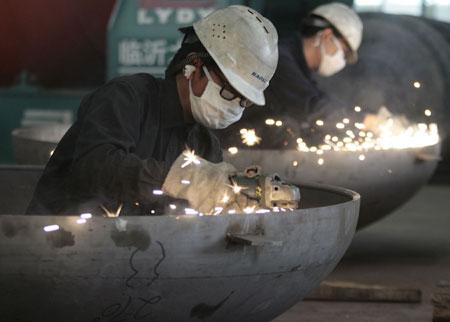
Workers melting steel products at a Nanjing factory. The official PMI for May stood at 53.9, down from 55.7 in April. An Xin / China Daily
BEIJING - The slower expansion pace of the Purchasing Manager's Index (PMI) for the manufacturing sector in May still demonstrates the economy's robust growth potential and should not be viewed as an economic moderation due to seasonal factors, analysts said.The PMI for May stood at 53.9, 1.8 points down from 55.7 in April, but still higher than the economic expansion boundary of 50 for 15 consecutive months, the National Bureau of Statistics and the Federation of Logistics and Purchasing said on Tuesday.
Some analysts said the PMI was probably declining from April due to policy tightening, but the magnitude of the fall was overstated due to seasonal distortion.
"Although the PMI compilers claim that they have seasonally adjusted the time series, the adjustment is obviously incomplete," said Ma Jun, chief economist of Deutsche Bank, China.
Since the PMI was first released in 2005, on average the May figures have been around 3 points lower than those of April and June.
The seasonal distortion has to do with the May holidays and the changes in the holiday schedules, which may affect the number of working days as well as work efficiency, he said. Manufacturing activity generally weakens during the three-day May Day holiday.
Lu Zhengwei, senior economist at the Industrial Bank Co Ltd, said the slower expanding pace of PMI is definitely not an indication of possible economic double-dip, as declines of sub-indexes like orders, input prices and raw material inventories are still significantly smaller than the same period in previous years.
"The PMI figure shows that overall economic activity and private investment needs further motivation for sustainable growth as manufacturing growth slows down," he said.
The PMI released by HSBC declined by 2.5 points to 52.7 in May, a continuous decline for two months, and set the lowest record since last June.
The new export orders index in the official PMI reported the best performance with a decrease of only 0.7 points in May compared with April. Stripping off the impact of the seasonality, the new export orders index was probably still rising despite the European sovereign debt crisis, analysts said.
The new orders index fell by 5.5 points to 54.8, suggesting that possible deceleration of the economic activity was largely domestic in nature.





